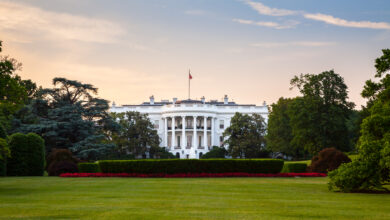
It started in January 2018. Trump hit China with a $53 billion tariff on steel and aluminum. Next, he hit Chinese solar panels and washing machines. When September 2018 rolled around, he handed Beijing a $200 billion tariff bill. China reciprocated with its own tariffs on U.S. goods, such as soybeans. A trade war was born.
Why? Trump has a whole list. To start, he says the deficit is too damn high ($375 billion). The U.S. buys more than it sells to China (The U.S. buys: $506 billion v. China buys: $130 billion). That, he says, in his abundant eloquence, is “not fair.” Another point that Trump doesn’t like (and he’s not alone): Chinese firms continually violate intellectual property and copyright. Fake Nikes, fake Louis Vuittons populate not only China’s market, but make their way to Chinatowns the world over. A final point (for space sake): espionage. China not only spies, it steals technology secrets from U.S. companies.
Last December, at the G20 Summit in Argentina, Trump and China’s President Xi JinPing agreed to call a truce and sit down for talks. That prevented Trump from slapping an additional $200 billion on Chinese goods. The timeline: 90 days. Those 90 days expire next Saturday, March 2. It looks like those talks are going well. Trump has said the talks are progressing “very well,” and has indicated they might continue past the March 2 deadline.
How will this end? The U.S. wants China to buy more of its products. It is also demanding that Beijing end subsidies aimed at boosting high-tech sectors China wants to dominate (China has set 2025 as goal for becoming a technology leader) and end practices that force U.S. companies into joint ventures with Chinese firms. (China does not allow foreign companies to operate on its own in 35 categories.) However these talks end, they’re not likely to result in a long-term solution. China has become a serious rival to the U.S. This trade war is unlikely to be the first – or last confrontation between the two powers.
Elmira talked to Ann Lee about the trade talks and what China wants for Project Syndicate. Subscribe to listen to that episode, which comes out on Tuesday, February 26.
- Kimberly Amadeo has a great explainer about why the U.S. deficit with China is so high. (The Balance)
- US-China trade talks: Which side holds the advantage? Lucy Hornby and James Politi discuss. (FT)
- Anneken Tappe on what a U.S. demand for China to stabilize its currency really means. (Marketwatch)
- Trump is troubled by currency manipulation? He should look in the mirror, writes Shuli Ren. (Bloomberg)
- A U.S.-China trade deal is coming, but how big will it be? Kimberly Ann Elliott dives in. (World Politics Review)
And this is a great report, authored by Wendy Leutert, Shan Guo, and Daniel Rosen, on corporate governance of China’s state owned enterprises. If you’re looking to dive deep in understanding China’s economy, this is a great place to start. (Asia Society)
The Wall
This doesn’t merit an explainer, but here it goes: Trump wants a wall. And, so, he declared a “national emergency” to build one. 🙄
- Reacting to President Trump’s national emergency declaration, Amelia Frank-Vitale writes that the real emergency is in Honduras — and that there may be no place where Hondurans seeking safety elsewhere can find refuge. (Washington Post)
- President Trump’s national emergency declaration is a threat to U.S. security, says Samantha Vinograd (CNN)
- Mexican cops are doing Trump’s dirty work, says FPI Fellow Alice Driver. (Daily Beast)
Democracy delayed
Those elections in Nigeria we told you would happen last Saturday — yeah, they didn’t happen. The country’s election commission announced, hours before the polls were set to open, that the vote needed to be postponed for a week. And the excuses were a-plenty. There were so many candidates, the body didn’t know who to put on the ballot.🤔 Bad weather and potholes prevented voting material from being delivered. Violence played a factor.
- Nigeria’s presidential election, which was postponed by a week hours before polls were due to open, “will be a bellwether for the increasing anxiety over the role of foreign private companies in African elections,” writes FPI Fellow Nanjala Nyabola. (Al Jazeera)
On February 14, a car bomb went off in Kashmir, killing 44, mainly security personnel. Kashmir is a contested territory located between India and Pakistan. India controls it. Pakistan claims it belongs to it. The bomb, which the Pakistani terrorist group Jaish-e-Mohammed took responsibility for, is the largest attack in three decades. Many are worried that this will escalate tensions between India and Pakistan. There is also the issue of how the Pakistani government responds to terrorism.
- Following last week’s bombing in Kashmir, Alyssa Ayres argues that the U.S. should put more pressure on Pakistan to combat terrorism. (CNN)
- Why is the foreign policy community so muted on last week’s attack in Kashmir, Emily Tamkin asks? (Washington Post)
Before they proclaimed mutual admiration, Trump referred to North Korea’s Kim Jong Un as “Rocket Man.” Kim called Trump “Dotard.” (Point: Kim). Four hours on June 12 changed all of it. The two leaders were “ready to write a new chapter.” That chapter will unfold next Wednesday and Thursday in Hanoi, when the two leaders plan to meet for a second summit.
- The good faith the U.S. was hoping would gain Pyongyang’s trust to commit to denuclearization only gives Kim the confidence he needs to expand his nuclear weapons program. All in the name of peace, Soo Kim explains. (The Hill)
- She also has a piece outlining the danger of this second Trump-Kim Summit. (The National Interest)
- Meanwhile, Trump says he’s in “no rush” to conclude a nuclear deal with North Korea’s Kim Jong Un. Alyza Sebenius reports. (Bloomberg)
- Vietnam can be template for a US deal with North Korea, says Huong Le Thu. (Asia Nikkei)
To read FP Interrupted in its entirety, click here. To subscribe, click here.




